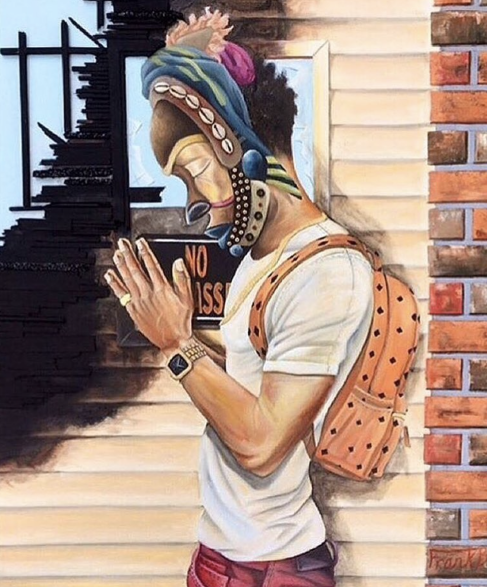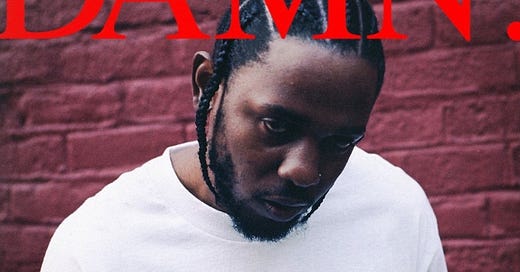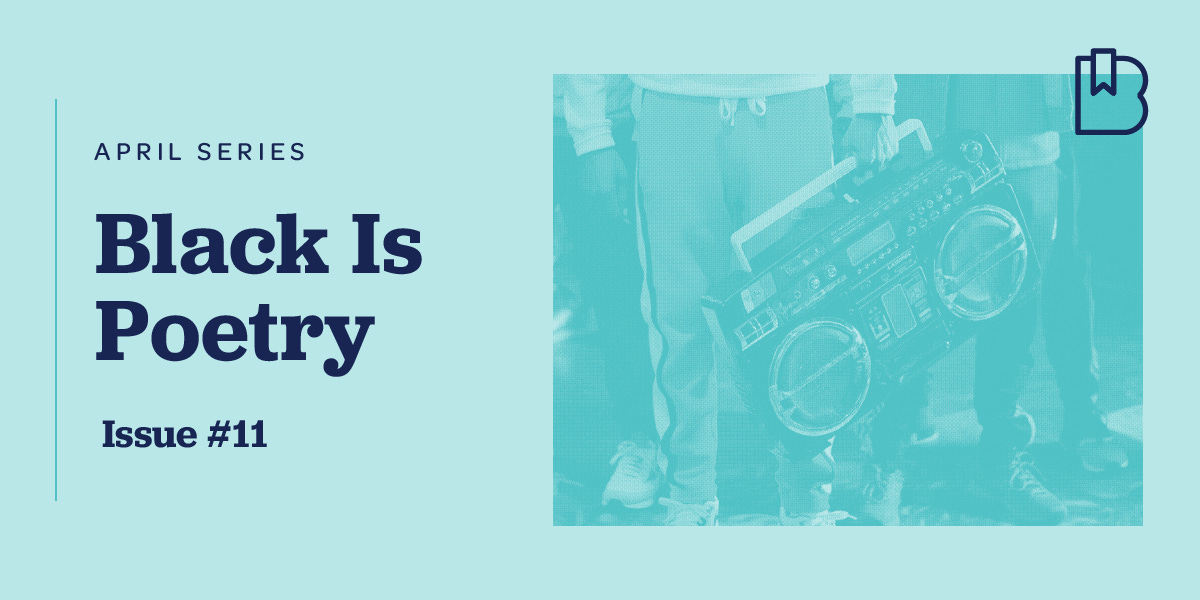Black Is Poetry
Welcome to issue #11! 📜
Black To School is focused on celebrating Black people and Black contributions around the world. The “Why?” that powers our mission is simple. “Our ancestors invented the table that the world now sits at. It’s time to not just claim our seat, but to set the agenda.” Please click on this link and learn more about the backstory behind Black To School.
This is National Poetry Month and we’re exploring our role in everything from creating written language to establishing a global literary canon. A special thanks 🙏🏾 to the readers below who were our “Golden Griots'' (or top sharers) for last week's issue about the Harlem Renaissance. Please keep sharing stories of #blackcontributions and our collective history within your networks!
Margot T.
Lydia F.
Nikki S.
Stacy B.
Adey D.
In this issue, we’ll:
Revisit what you think you know about the genre of Hip Hop and its connection to one of the oldest and respected forms of literature, Poetry.
Read, watch, and experience Hip Hop as you would any Shakespearean play. Make your own rhymes and embrace the lyrical genius within.
We heard you! Starting today, we’ve updated our weekly newsletter release schedule to Mondays in order to jump start your week!😎

Poetic License
Contributor: Obinna Onyeagoro
Whether we are talking about lines and verses, rhyme and meter, or cadence and rhythm, Africans, African Americans, and other African Diaspora poets have been using literary devices since ancient times. We all experience these clever and compelling techniques not only when we read a poem, but also when we listen to our favorite songs; recite prayer; give testimony; cheer for sports teams; watch commercials; read a birthday card; and enjoy a night at the theater.
There is nearly unanimous agreement on the broad technical definition of poetry from sources ranging from dictionaries, anthologies, and literary journals to prize organizations, academics, and critics. It’s a form of literature that uses sound, imagery, and pace to create abstract and/or literal meaning. And there are at least 36 different genres of poetry, which are formally acknowledged and studied. For centuries, Black poets have won prizes and received high marks for demonstrating mastery of poetry as defined by the West.
However, what’s curious is that many of the genres popularized by Africans and the African Diaspora, which also conform to the technical definition, are not generally recognized as poetry. They include everything from oral folk tales, spirituals, call and response to jazz, blues, funk, hip hop, spoken word, and more. They are typically regarded as and confined to “performance art” - a combination of disciplines that are excluded from core academic curriculum and canon literature.
The impassioned and singular case against recognizing song and spoken word as poetry is that the lyrics don’t stand on their own as the verses in poems do. Yet, many struggle to defend this argument when reminded of the origins of celebrated narrative poets like Homer, Milton, Tennyson, Alighieri. Today, the debate still rages on as to whether to include these beloved forms of Black poetry in the annals of literary history.
What is the genius that lives within Hip Hop?
In August 1973, Hip Hop was born at a birthday party in the Bronx hosted by a native Jamaican, Clive Campbell (also known as DJ Kool Herc). His breakbeats at the turntable started as an improvised experiment and quickly became an underground cultural movement that included new sounds, beats, and rhymes that could only be experienced at house parties and neighborhood block clubs. Click here to listen to the 2-minute history of Hip Hop.
Serendipity played a big role in Hip Hop’s beginnings, but it is not the full story. You can trace the roots of Hip Hop back to griots in Africa’s Mali kingdom. Griots were the keepers of their people’s traditions and history. They were so highly respected and central to the survival of local communities that they became a separate class of people in society. They passed their craft down from generation to generation. Like modern day rappers, griots were multi-faceted performers - skilled in the art of poetry, music, and storytelling. This cultural phenomenon later spread throughout Africa and was transported to Jamaica.
Hip Hop, also inspired by the Black Arts Movement, has continuously been extended and shaped to reflect the talents, experiences, and points of view of its biggest proponents, Black writers, musicians, DJs, dancers, producers, philosophers, intellectuals, graphic artists, fashion designers, and other creatives. As a result, the magic of Hip Hop is that it cannot be siloed nor contained. By design, it amplifies and fuses at least five different disciplines:
Deejay - mix and maneuver prerecorded music
Dance - choreograph specialized movement
Graffiti - stylize writing that infuses meaning
Emcee, inc. Rap - spoken word performance that integrates storytelling, poetry, and drama
Social Anthropology - introspection and reflection on personal and societal norms, values, and behaviors
The poetic devices that are part of Hip Hop songs and a signal of high art commonly include: (rhythm) repetition and rhyming; (sound) alliteration and assonance; and (meaning) allusion, metaphor, and analogy. In some ways, Hip Hop is a type of lyric poetry.
Hip Hop artists like Kendrick Lamar, Kanye West, Nas, Jay-Z, Tupac Shakur, Missy Elliot, Grandmaster Flash, Wu-Tang Clan and so many more are considered modern day poets (griots). With the exception of Shakespeare, they are more well known than most of the Western canon. And some credit Hip Hop culture for (re)popularizing and keeping the literary tradition of poetry alive.

Hip Hop Forever
Times are changing and Hip Hop has taken center stage. Harvard University, Stanford, Princeton, UCLA and other top schools now have academic courses and research institutes focused on studying Hip Hop. There have been over 17,000 doctoral theses written on the subject of Hip Hop. In 2017, for the first time, Hip Hop surpassed Rock as America’s #1 streamed music category. In 2018, artist, Kendrick Lamar, broke the proverbial barrier by winning the Pulitzer Prize for Music.
The glass door that separated Hip Hop and poetry has been forever shattered. It is now open to recognize other Hip Hop artists for their mastery and literary contributions. Black poetry takes many forms and defines mainstream culture.
🛠️ The Black To School Toolkit
Now What? Dig Deeper with Friends, Family, and Others.
Want to learn more about our tradition of oral literature, including Hip Hop? Skim excerpts from this beautiful audio-visual archive, curated by Furious Flower. Dig Deeper? Read the book, Rhyme’s Challenge, which makes the most powerful argument for Hip Hop lyrics as a transcendent form of poetry.
Guess what Othello and Wu-Tang Clan have in common? Watch this TED Talk in which rapper-philosopher, Akala, draws shocking parallels between Hip Hop and Shakespeare. Then Chill Out! Enjoy listening to this cool montage of Hip Hop lyrics and beats from 1979 to 2017.
Ready to expose your kids to the real thing? Watch this TEDEd animated video that talks about “What makes a poem...a poem?” And read this children’s book to explore the poetic tradition of Hip Hop. For you and your teens? Do these fun, classical poetry vs Hip Hop lyric comparison exercises.
Curious who has more skills? Checkout this chart that ranks rappers by the size of their vocabulary. Want more? Read this anthology, endorsed by Professor Henry Louis Gates, which analyzes an anthology of 300 rap lyrics as poetry.
Do you have what it takes? First, get inspired by streaming the international Broadway sensation and Hip Hop musical, Hamilton. Now take a MasterClass with Grammy-winning producer, Timbaland, or multi-platinum, singer-songwriter, Alicia Keys.
Eager to support an institution that promotes Hip Hop artists as part of the literary canon? Visit the Hip Hop Archive and Research Institute at Harvard University’s Hutchins Center. Does your alma mater have Hip Hop courses? If not, reach out to your alumni group and find out why. Also, support the Universal Hip Hop Museum and explore partnerships.
⌛ The Black To School Timeline
Black Poetry Takes Many Forms and Defines Mainstream Culture.
We began by stepping into Prehistoric times (At least 5,000 Years Ago) The Thing: Sumerian and Nsibidi, the first written language systems, created by Black Africans in Mesopotamia.
Followed by zooming into the 20th Century (100 Years Ago) The Place: Harlem (Renaissance), a community of writers and activists that inspired one of the greatest artistic, cultural, and intellectual movements.
This week, we spotlight the 1970s (50 Years Ago) The Practice: Hip Hop, the lyrical genius that sits at the intersection of poetry, philosophy, and performance art.
Next week, we return to current times (Present Day) The Promise: Afrofuturism, the freethinkers who use artistic expression and technology to create a powerful vision for society and the planet.
About This Week’s Contributor
Obinna Onyeagoro
Based in London, Obinna (Obi) Onyeagoro is active in Egon Zehnder’s Financial Services practice. Obinna’s focus is to build close, trusted relationships advising senior executives on their leadership challenges across multiple sectors, including private-equity, private-credit firms, infrastructure funds and technology & media organizations.
Before joining Egon Zehnder, Obinna headed the Financial Sponsors Group for EMEA at Standard Chartered Bank, focusing on private equity clients, corporates and financial sponsors. Earlier he was an investment banker with Deutsche Bank Securities in New York on the Leveraged Finance team. Obinna began his career as a consultant at Accenture, focusing on tech strategy.
Obinna earned a BS in electrical engineering from Boston University, a Master’s in education with a technology focus from Harvard University, and an MBA from Harvard Business School. He is passionate about technology, education, and impact investing in emerging markets with an emphasis on Africa and renewable energies.
As we reclaim our history and legacy of achievement and contributions, Black to School is an important tool and catalyst for our global African diaspora community of both parents and children. People with no past will find it difficult to chart a course forward. Black to School is (re)connecting us with our brilliant past and present so that we may walk boldly into our bright future.





